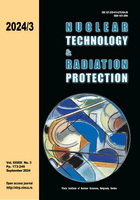
A NOVEL METHOD FOR CALCULATING NUMBER BUILDUP FACTOR IN GAMMA-RAY TRANSMISSION MEASUREMENTS USING NARROW BEAM GEOMETRY

Vol.
XXXIX, No. 3, Pp. 173-249
September 2024
UDC 621.039+614.876:504.06
ISSN 1451-3994
Pages: 185-198
Authors: Huynh Dinh Chuong, Le Thi Ngoc Trang, Nguyen Thi Truc Linh, Vo Hoang Nguyen,
and Tran Thien ThanhAbstract
In this article, we present a novel method to calculate the number buildup factor for arbitrary materials in gamma-ray transmission measurements using a narrow beam geometry. The MCNP6 code was used to simulate photon transport within a collimated transmission configuration, which included a NaI(Tl) scintillation detector paired with a 137Cs or 60Co radioactive source. From these simulations, the number buildup factor values were computed for various materials at gamma-ray energies of 661.7 keV, 1173.2 keV, and 1332.5 keV, with sample thicknesses ranging from 0.1-7.0 cm. At each specific gamma-ray energy and material, the number buildup factor values exhibited a strong linear relationship with the sample thickness. Furthermore, the slope of these linear relationships can be expressed as a product of mass density and a cubic polynomial function of the atomic number. Based on these findings, we developed a fitting formula to calculate the number buildup factor using the input variables of sample thickness, mass density, and atomic number. The accuracy of the fitting formula was evaluated by comparing its results with number buildup factor values computed by MCNP6 code. The comparison showed relative deviations below 1 % for all the investigated cases, demonstrating the high accuracy and reliability of the fitting formula.
Key words: gamma-ray transmission, Monte Carlo simulation, MCNP6, NaI(Tl) detector, narrow beam geometry, number buildup factor
FULL PAPER IN PDF FORMAT (1,11 MB)